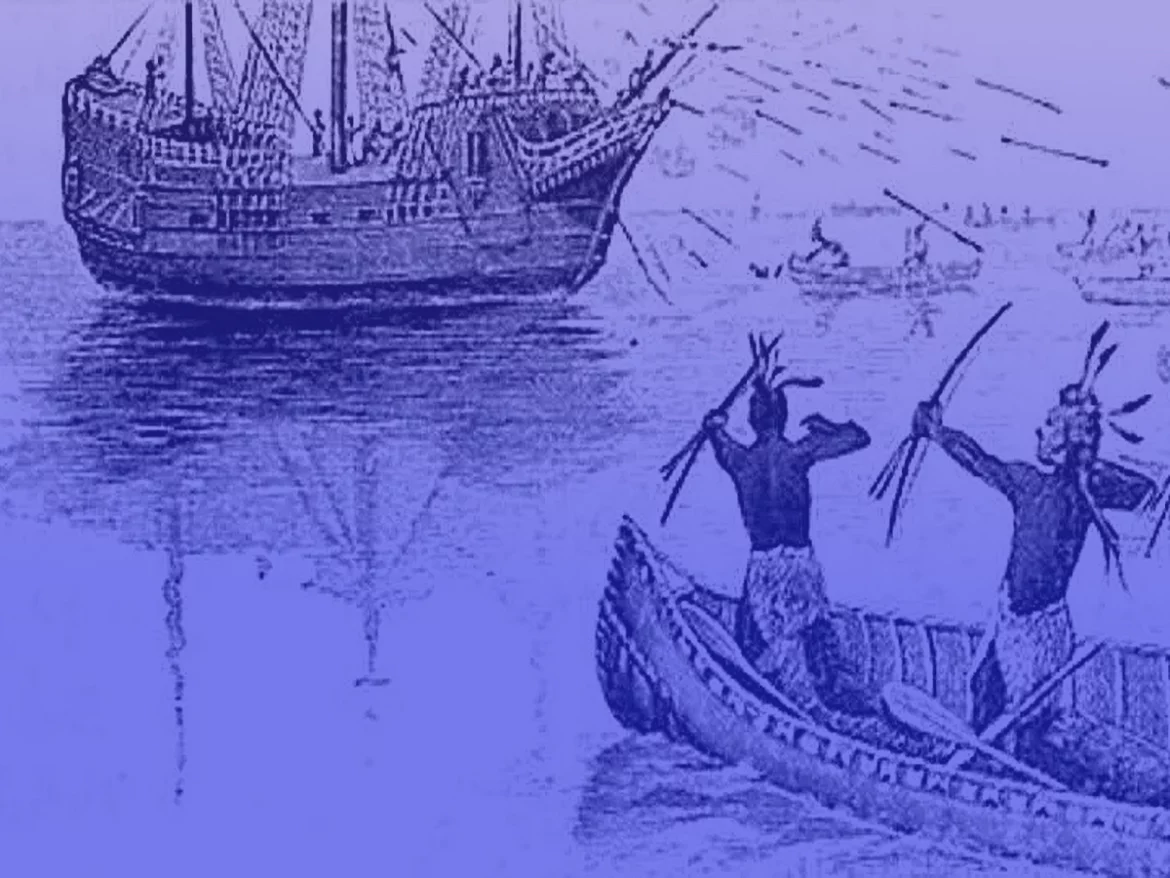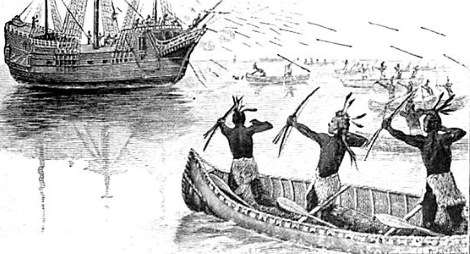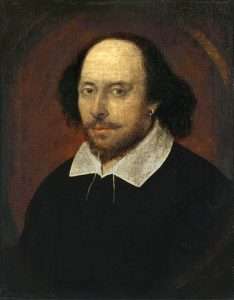William Shakespeare probably saw Epenow when he was put on display in London in 1612. Several English sea captains probably wished they’d never laid eyes on him.
Epenow was a big, smart Wampanoag who lived on Martha’s Vineyard. In 1611, Capt. Edward Harlow captured him while exploring the New England coast.
Harlow had been commissioned by Sir Ferdinando Gorges to kidnap natives for slaves while he explored the New World. Harlow captured another Indian on Marrtha’s Vineyard, one on Nantucket, three on Monhegan Island. He possibly kidnapped Tisquantum – later known as Squanto by the Pilgrims at Plimoth Plantation. All told, Harlow brought 30 native captives to London, intending to sell them to the Spanish as slaves.
The slaving expedition would have unforeseen consequences. Among them: the Spanish weren’t interested. They viewed Indians as unfit slaves.
And they created in Epenow an intractable enemy.
Epenow, Strange Indian?
Londoners were fascinated by the exotic American Indians brought to England by explorers. The captives became sideshow attractions in street carnivals, coffeehouses and taverns.
William Shakespeare saw how the Indians created a sensation. In The Tempest, Trinculor complains “when they will not give a doit to relieve a lame beggar, they will lay out ten to see a dead Indian.”
Epenow was exhibited as a physical marvel. His cries of “Welcome! Welcome!” were well-known among Londoners who frequented coffeehouses and taverns.
Shakespeare was probably thinking of Epenow when he mentioned a ‘strange Indian’ in his play Henry VIII.
Porter: What should you do, but knock ’em down by the dozens? Is this Moorfields to muster in? or have we some strange Indian with the great tool come to court, the women so besiege us?
Epenow was taken to Sir Ferdinando Gorges, the English colonizer, soldier and governor of Plymouth, England.
Gorges was impressed. He described Epenow as ‘a person of goodly stature, strong and well-proportioned‘ as well as brave, stout and sober.
Epenow was also clever.
Gorges took Epenow as his own slave and housed him with another Indian, Assacumet, who taught him English. That allowed Epenow to observe Gorges’ hopes and dreams — and to figure out a way to return home.
He persuaded Gorges he could show him a gold mine on Martha’s Vineyard.
Gorges took the bait. He commissioned a voyage to Martha’s Vineyard, with Epenow and one or two other Indians along as translators and guides. Also backing the trip were Shakespeare’s sponsor the Earl of Southampton and Capt. Nicholas Hobson.
Home
Gorges didn’t completely trust his Indian slave. He ordered Hobson to guard him closely and to dress him in long clothing so he could be grabbed easily.
When Hobson sailed into the harbor at Martha’s Vineyard, Epenow’s people greeted the vessel peacefully. Hobson invited them aboard ship.
Once the Wampanoags came on deck, Epenow quietly hatched an escape plan with them. The Indians told Hobson they’d return with trade goods.
The next day, the Wampanoags arrived in 20 canoes, but refused to board the ship. Hobson talked and gestured, but they remained standoffish. Hobson called Epenow out of the hold to translate.
Epenow welcomed his people in English, which they didn’t understand, and instructed them in his own tongue, which the English didn’t understand. Then he tried to lunge off the ship. The crew grabbed hold of his clothing, but he was so big and heavy he dove overboard. When he hit water, the Indians shot arrows at the ship. The English returned fire, killing some of the Indians. Capt. Hobson and the crew were wounded.
The ship returned to England without any gold or the Indian slaves. Hobson told Gorges Epenow had been killed.
“Thus were my hopes of that particular made void and frustrate,” wrote Gorges.
War Now New
Epenow had no use for the English from then on. He may have become a sachem, and he led the Indians’ resistance to the colonizers.
In 1619, a captain Thomas Dermer came to Martha’s Vineyard. Epenow visited with him peacefully and told him, laughing, about his escape.
Dermer returned the next year, shortly before the Pilgrims arrived. Squanto was aboard.
Epenow’s men, not so friendly this time, attacked him and his crew. They retook Squanto and killed all but one of Dermer’s crew. Dermer was wounded. He escaped to Virginia, where he died.
Gorges eventually obtained a patent for a huge tract of land that became Maine. He never set foot in the New World. But he seemed to understand that capturing and enslaving Indians had consequences. He wrote,
A war now new begun between the inhabitants of those parts, and us.
This story last updated in 2023.




4 comments
[…] sailors along the Maine coast. Squanto spoke the language well, because English explorers had captured him and him taken to England as a slave […]
[…] Morton wrote New English Canaan, a witty composition that praised the wisdom and humanity of the Indians and mocked the Puritans. It made him a celebrity in political […]
[…] of the land area between the Kennebec and Merrimack Rivers, the northern portion was granted to Sir Ferdinando Gorges, another early […]
[…] decided to colonize the New World after receiving three captured North American Indians from an English ship […]
Comments are closed.